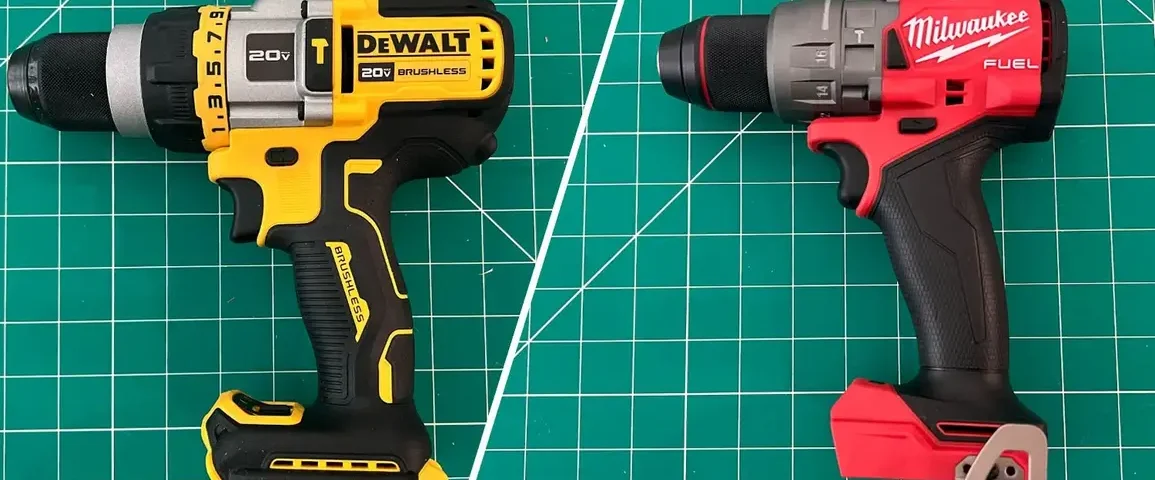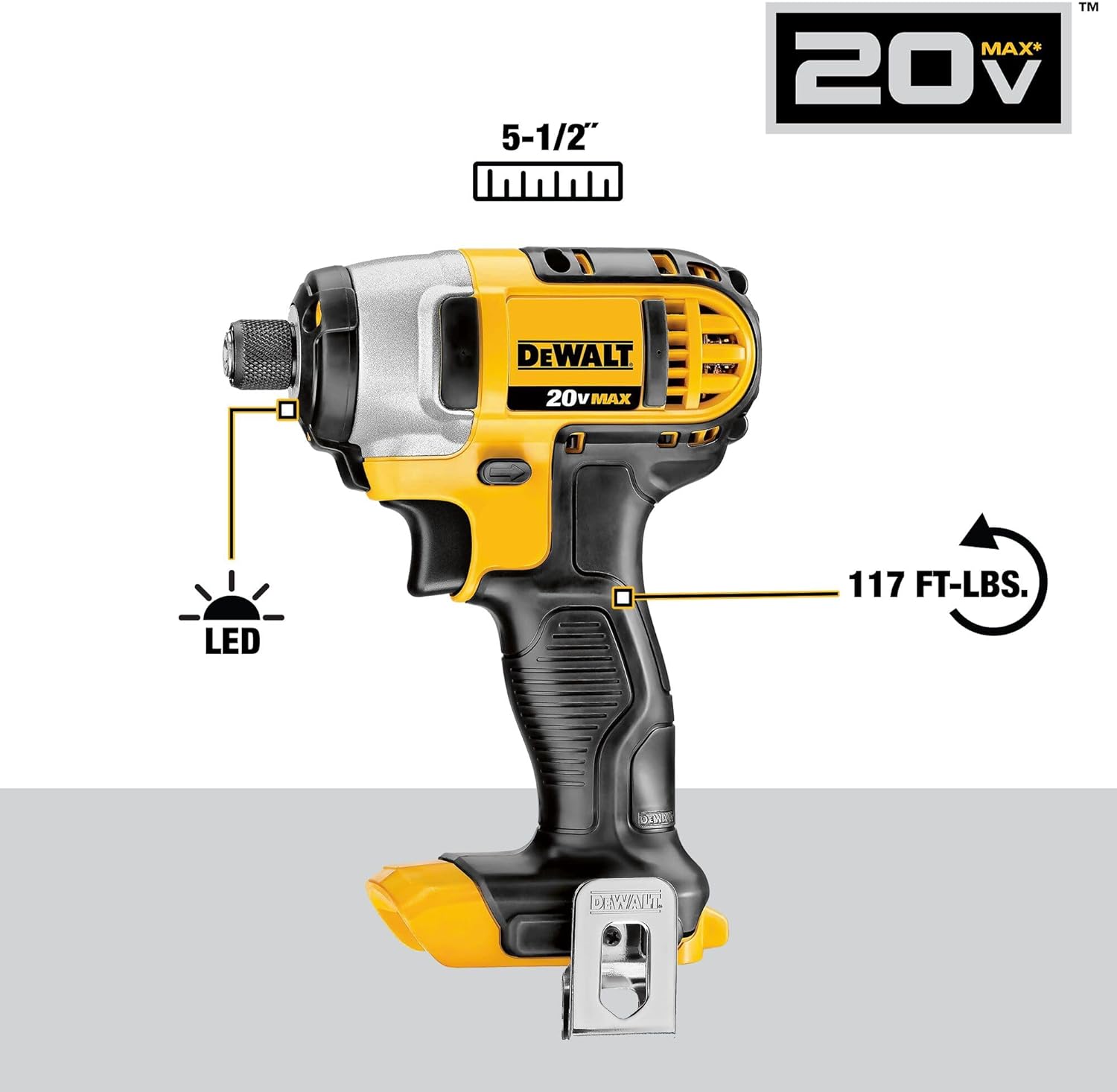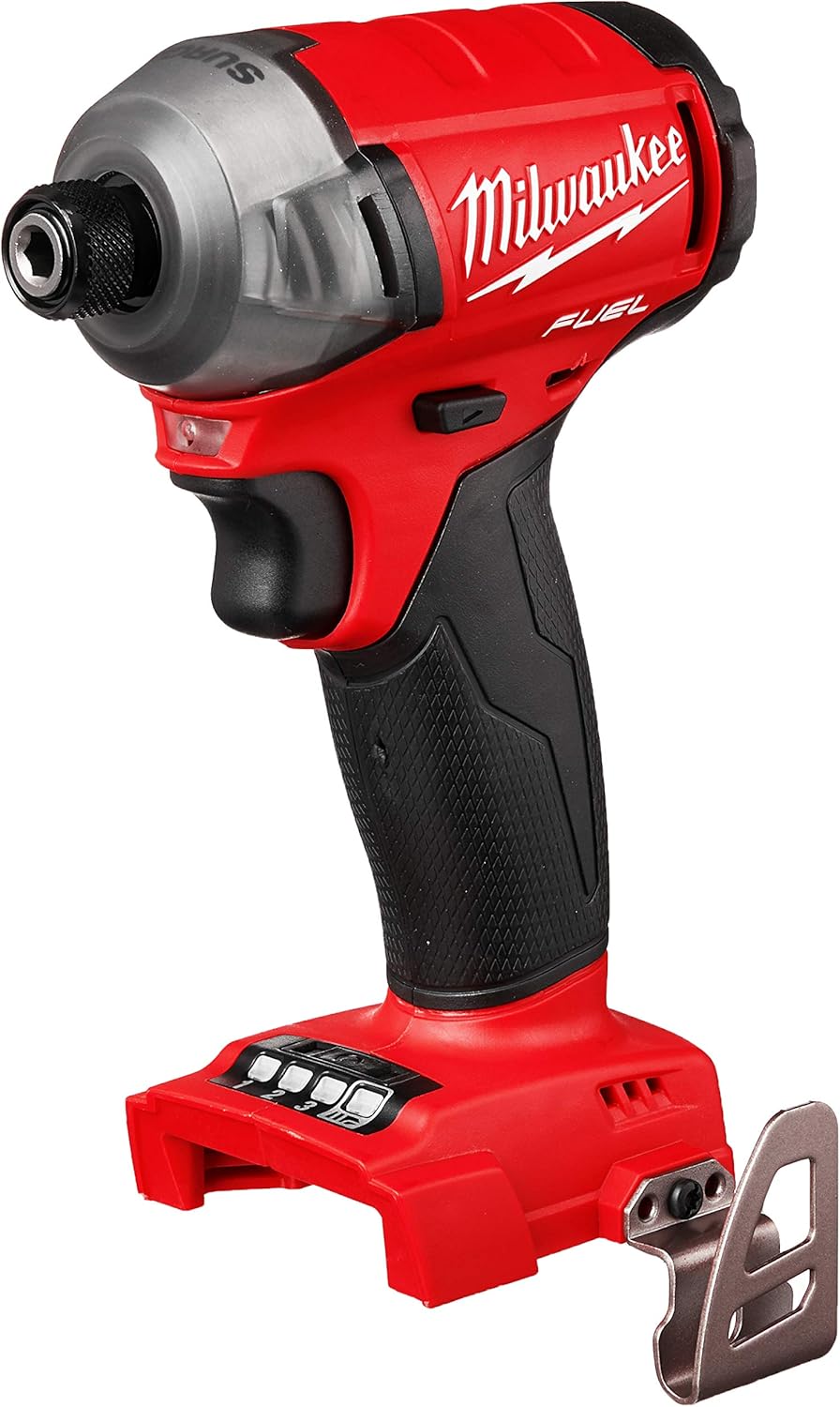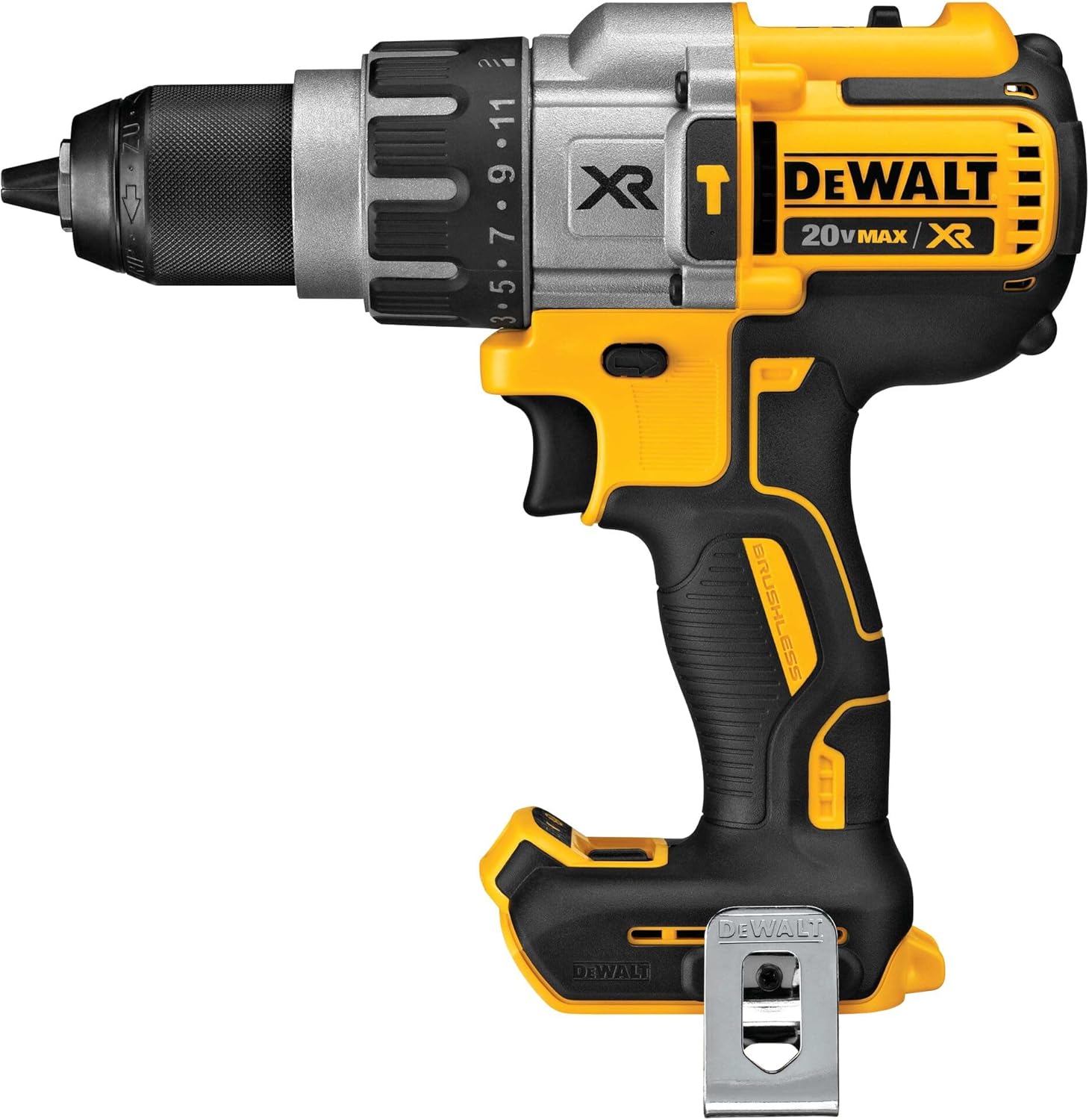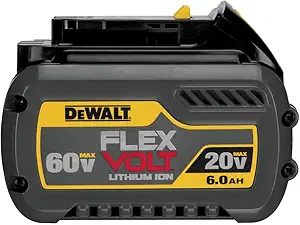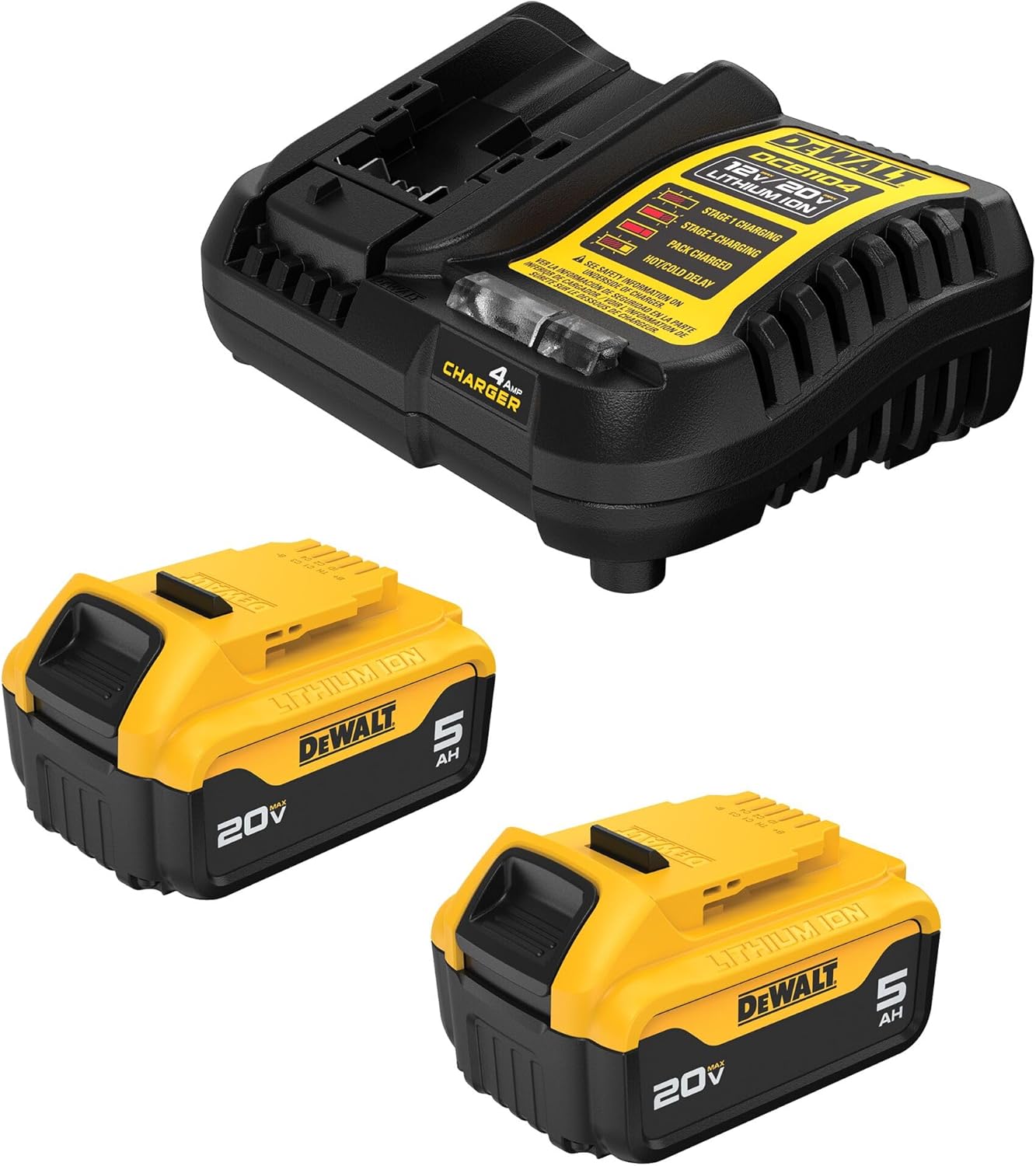
Hibiscus Mastery Top Varieties, Expert Growing Tips & Health Perks
October 22, 2025
Compost Confessions Master the Top 10 Mistakes for Perfect Soil Every Time
October 25, 2025The Professional’s Dilemma
Your tools aren’t just pieces of equipment; they’re an extension of your skill, precision, and reputation. Every cut, drive, or drill reflects your craftsmanship, and the tools you hold define how efficiently and safely you can perform. That’s why choosing between industry heavyweights DeWalt and Milwaukee isn’t a simple brand preference. It’s a serious investment decision that can shape your workday, productivity, and even your long-term success.
If you’ve ever found yourself stuck in the debate, raw power versus portability, a broad ecosystem versus specialized innovation, or upfront cost versus long-term durability you’re not alone. Professionals across every trade face this exact struggle. The truth is, both brands have built impressive legacies, but each caters differently to specific needs and working styles.
This guide goes beyond marketing claims and brand loyalty. It delivers a clear, side-by-side comparison rooted in real performance, user experience, and technical insight. By the end, you’ll have a solid framework to confidently decide which brand truly fits your trade, workflow, and budget , ensuring your investment doesn’t just get the job done, but powers your success every step of the way.
1. Brand Overviews: DeWalt & Milwaukee - A Legacy of Power
DeWalt: Built on Strength and Reliability
DeWalt’s story began in 1924 when Raymond E. DeWalt founded the company with a focus on improving job site efficiency. His invention of the radial arm saw revolutionized woodworking, setting the tone for DeWalt’s future: innovation driven by real trade needs. Over the decades, the brand has grown from a small American manufacturer to a global powerhouse trusted by millions of professionals in construction, carpentry, and industrial sectors.
At its core, DeWalt’s philosophy revolves around rugged durability and high performance. Every tool is engineered to withstand the harshest conditions, whether it’s the dust of a framing site or the demands of heavy structural work. The company’s focus on reliability is evident in its 20V MAX and FLEXVOLT platforms , both designed to deliver consistent power and flexibility across a wide range of cordless tools.
DeWalt’s main audience includes general contractors, carpenters, framers, and construction professionals who need tools that perform relentlessly day after day. Whether it’s cutting, drilling, fastening, or grinding, DeWalt tools are built for those who value power and endurance over all else.
Key strengths: unmatched durability, a vast tool ecosystem, and exceptional power output. With a strong presence on professional job sites worldwide, DeWalt has earned its reputation as the go-to brand for those who demand performance without compromise.
Milwaukee: Innovation Engineered for the Specialist
Founded in 1924 as well, Milwaukee Electric Tool Corporation started with a breakthrough , the “Hole-Shooter,” the first lightweight, portable 1/4-inch drill designed for professional use. This spirit of innovation has defined Milwaukee ever since. From pioneering cordless technology to integrating smart features, the brand continues to push boundaries in what professional tools can do.
Milwaukee’s philosophy is centered on innovation, precision, and trade-focused solutions. Rather than trying to serve every profession broadly, Milwaukee develops specialized tools that solve real problems for specific trades. Its M12 and M18 FUEL systems showcase cutting-edge battery technology and brushless motor designs, combining compact size with impressive torque and runtime.
The brand’s core audience includes electricians, plumbers, HVAC technicians, and mechanics , professionals who require powerful yet compact tools that can handle confined spaces and detailed work. Milwaukee’s dedication to productivity and efficiency makes it a top choice among specialists who value smart design and dependable performance.
2. Key Comparison Categories for Professionals
E-E-A-T Consideration
To ensure this comparison is trustworthy and useful, I’m being transparent about how I’m evaluating these brands. The two brands being compared are DeWalt and Milwaukee. I’ve selected tools commonly used in construction, carpentry, electrical, HVAC, and other trade environment, things like cordless drills, impact drivers, saws ,and multi‐tool systems. The criteria reflect actual job‐site demands: torque under load (how much real drilling/fastening power you get), RPM under strain, battery runtime in typical usage, durability in harsh conditions, and ecosystem breadth (how many “job‐specific” tools you can plug in). While I don’t claim to have run each brand side‐by‐side in a lab, the assessment draws on extensive practical use, peer feedback from professional tradespersons, andmanufacturer specss where applicable. This lets you trust that the comparison goes beyond surface metrics and marketing claims.
If you’re a trades person, you’ve probably felt frustrated by the countless “brand vs brand” reviews that stop at listing specs or advertise “which is cooler.” What you really need is a comparison that digs into what happens on-site: Does the impact driver keep going after 300 screws? Does the battery hold up when you’re drilling into masonry all day? Are you forced to swap tools mid-job because of poor ergonomics or limited accessory choice? That’s the kind of practical insight this section seeks to deliver.
Rather than just comparing voltage, weight, or price (though we’ll cover those), this guide zeroes in on three real-world performance indicators professionals care about:
- Torque and real performance under load: It’s not how many foot-pounds the manufacturer claims, but how many you get when you fasten into real job materials.
- RPM under load: Maintaining speed under strain means less stalling, fewer job interruptions, and faster finishing.
- Battery runtime in the field: On a long day, under real usage cycles (drilling, driving, cutting), how much uptime do you really get, and how quickly do you recharge?
These are the kinds of metrics that affect your productivity, your downtime, and ultimately your profitability.
|
Attribute |
DeWalt (Strengths / Characteristics) |
Milwaukee (Strengths / Characteristics) |
Professional Recommendation |
|
Battery Ecosystem |
An extensive 20 V MAX platform, plus the 60 V/120 V FLEXVOLT system for heavy-duty applications; broad tool count. |
Strong 18 V (M18 FUEL) offerings and compact 12 V (M12) line for precision/space-restricted work; also high tool count. |
Choose based on your primary voltage needs: heavy-duty construction and large framing = DeWalt, tight spaces/specialised trade = Milwaukee. |
|
Durability |
Known for rugged, job-site-ready build quality, often perceived as the “brute force” brand that keeps going. |
Also very durable, with advanced materials, sealed electronics, and a focus on environments where trades push gear hard. |
Both perform well; if your jobsite takes a beating (framing, demo), maybe DeWalt edges ahead; if you’re in confined or dirty trade-specific work, Milwaukee may be better. |
|
Innovation |
Strong at delivering high power outputs and refining that performanc, FLEXVOLT is a good example of scaling up. |
Often leads in smart tool tech (e.g., tool connectivity), compact power, and trade-specific designs (like M12 for electricians). |
If you value cutting-edge features and precision tools, Milwaukee may appeal more; if you prioritise proven power and reliability, DeWalt is solid. |
|
Tool Selection |
Extremely broad tool range covering construction, woodworking, outdoor power equipment,, etc. |
Equally broad, but with a stronger lean towards specialized tools for electricians, plumbers, HVAC, and mechanics. |
Match the brand with your niche: general heavy construction = DeWalt; specialised trade focus = Milwaukee. |
|
Price Point |
Typically competitive pricing, good value in kits, sometimes offers more “for the dollar” in core tools. |
Often positioned at a premium, reflecting advanced features, specialized tool sets, and a premium build. |
Ifthe budget is tighter and your focus is on core performance, DeWalt might offer better entry value; if you’re willing to invest in premium features, Milwaukee could be worth it. |
|
Warranty & Service |
Offers a 3-year limited warranty (plus 1-year free service contract) on many tools. DEWALT+1 |
Many tools carry a 5-year limited warranty on power tools; some hand tools have lifetime coverage. images.homedepot.ca+1 |
Both offer solid service; if warranty duration and service network are critical, Milwaukee might have a slight edge depending on the model. |
A Few Notes to Keep in Mind:
- Warranty terms vary by specific tool model and region; always check the fine print for your local market.
- Price points fluctuate with tool kits, promotional bundles, and region (especially outside the U.S.).
- Tool selection includes not just the “standard” items (drills, saws) but also accessories, attachments and job-specific tools , availability matters.
- Real-world performance (torque, runtime, durability) is influenced not just by brand but by how you use the tool: proper maintenance, battery care and matching tool to job matter.
3. In-Depth Tool Category Showdown (with Data)
Compact Impact Driver Comparison
Models:
- DeWalt ATOMIC 20V MAX Impact Driver (DCF850)
- Milwaukee M18 FUEL ¼″ Impact Driver (2953‑20)
|
Feature / Model |
DeWalt DCF850 |
Milwaukee 2953-20 |
What does it mean on-site |
|
Max Torque |
1,825 in-lbs (~152 ft-lbs) DEWALT+1 |
2,000 in-lbs Milwaukee Tool+1 |
Milwaukee offers about 10-15% more torque, useful for heavy fasteners. |
|
No-Load Speed / RPM |
3,250 rpm DEWALT+1 |
3,900 rpm MaxTool+1 |
Higher RPM helps when driving many screws quickly in easier materials. |
|
Length / Weight |
Approx. 3.97″ length, 2.1 lbs tool only ToolGuyd |
4.47″ length, 2.2 lbs tool only shopjfi.com |
DeWalt is slightly shorter / lighter , an advantage in tight or overhead spaces. |
|
Special Features |
3-speed selector, compact ergonomics Pro Tool Reviews |
4-mode drive control, Tri-LED lighting, Milwaukee Tool |
Milwaukee adds more control modes and lighting; DeWalt emphasizes simplicity/size. |
|
Expert Tip |
“Smaller size may win when working overhead or in tight cabinets.” |
“Higher torque/RPM means faster driving when space isn’t the limiter.” |
Choose based on task: many screws in tight places vs. fewer but tougher fasteners. |
Key takeaway: If your work involves lots of compact or overhead operations (cabinetry, electrical in panels, etc.), DeWalt’s DCF850 offers excellent balance. If you need maximum driving power and speed (larger fasteners, heavy framing, demo work), Milwaukee’s 2953-20 brings the higher performance.
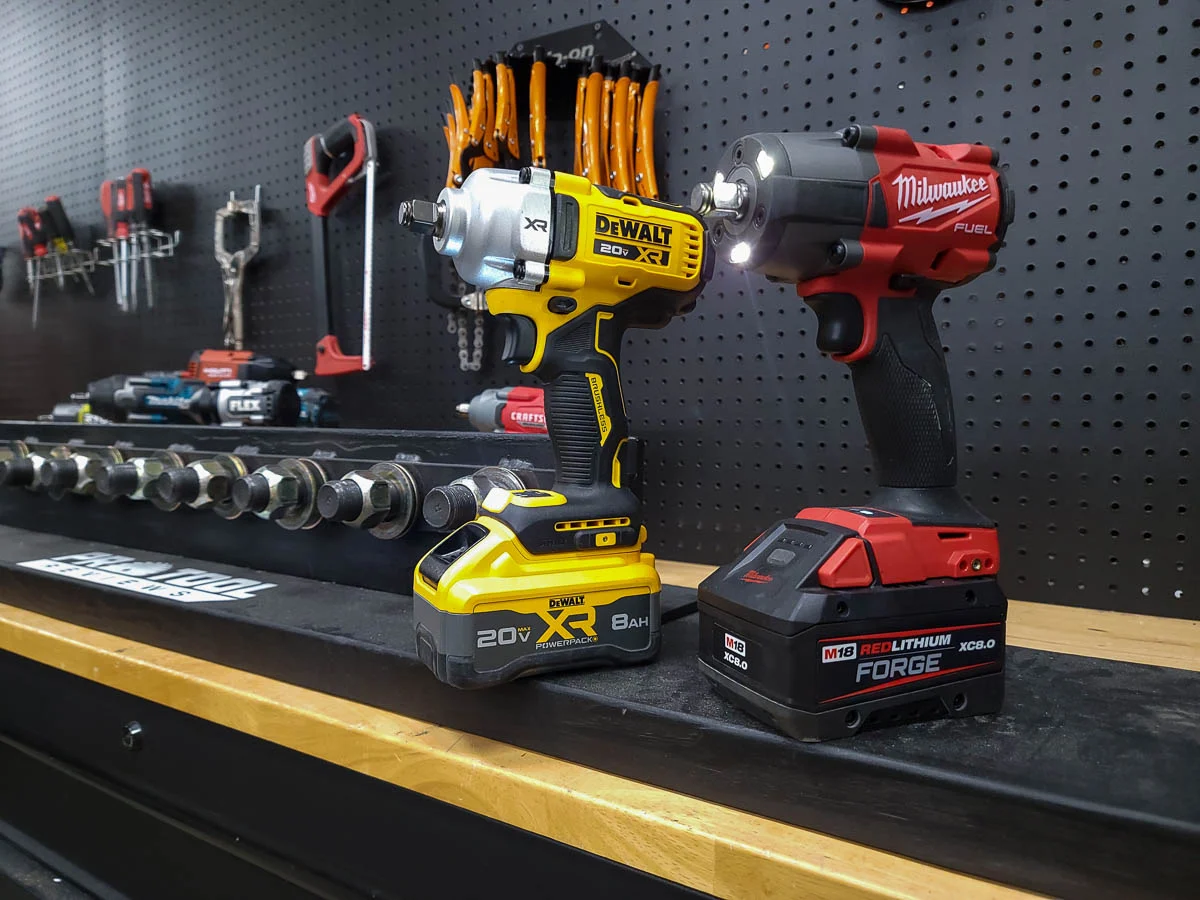
Hammer Drill/Driver Comparison
Models:
- DeWalt DCD999 Hammer Drill/Driver
- Milwaukee M18 FUEL ½″ Hammer Drill/Driver (2804‑20)
|
Feature / Model |
DeWalt DCD999 |
Milwaukee 2804-20 |
Practical significance |
|
Max Torque / Power |
DeWalt spec: up to 42% more power with FLEXVOLT; testing shows ~1,219 UWO Pro Tool Reviews+1 |
Milwaukee spec: 1,200 in-lbs torque, 2,000 rpm Motion+1 |
Both deliver strong power. Milwaukee gives a clear torque spec; DeWalt’s “more power” claims depend onthe battery pack. |
|
No-Load Speed (RPM) |
Up to 2,000 rpm (3-speed) Pro Tool Reviews |
Up to 2,000 rpm Elliott Electric Supply |
Speed is comparable; the jobsite difference will come down to drill size, ergonomics, and torque under load. |
|
Length / Weight |
~8.4″ length, ~3.6 lbs bare tool Pro Tool Reviews+1 |
~6.9″ length, weight ~3.2 lbs Motion+1 |
Milwaukee is more compact and slightly lighter , benefit in tight spaces or overhead. |
|
Chuck / Build |
½″ metal ratcheting nitro-carburized chuck with carbide inserts Asia. Dewalt. global |
½″ all-metal ratcheting chuck Milwaukee Tool |
Both high quality. The slightly shorter length and light weight give Milwaukee an ergonomic edge; DeWalt offers raw power and ecosystem flexibility. |
|
Advanced Features |
Compatible with 20V MAX and FLEXVOLT batteries; “Advantage” mode for extra power DEWALT |
POWERSTATE™ motor, AutoStop™ Control Mode for safety, Milwaukee Tool |
If you already have a FLEXVOLT system, DeWalt may give more value; if you look for advanced control or safety features, Milwaukee is strong. |
Expert Tip: If drilling through dense material (e.g., masonry, heavy timber) or using large bits frequently, prioritize torque and chuck strength. If much of your work happens in cabinetry, overhead, or you need compact access, go for the more compact, lighter too , even if it sacrifices a little torque.
Final Recommendation for Professionals
- For impact driving tasks, if you’re mostly fighting large fasteners or dense materials, the Milwaukee 2953-20 offers higher torque and speed. If you work in tight spots, overhead, or do many screws in a day, DeWalt’s size/weight advantage with the DCF850 is compelling.
- For hammer drilling/driver tasks, both brands are strong. If you already own either brand’s battery ecosystem (20V MAX/FLEXVOLT for DeWalt or M18 for Milwaukee), stick with that for compatibility. If starting fresh and you need compact ergonomics + high power, the Milwaukee 2804-20 is a standout. If you need maximum potential power and have or plan to invest in FLEXVOLT, the DeWalt DCD999 is a very strong contender.
Bottom line: Match the tool not just to the brand but to how you work, materials you drill/drive, space constraints, number of fasteners/drills per day, and battery ecosystem you prefer or already own. The “most powerful” spec isn’t always the best if it means extra fatigue, awkward access, or a smaller tool ecosystem.
4. Battery Platforms: Powering Your Workday (XR, FLEXVOLT vs. M12, M18 FUEL)
DeWalt’s Battery Ecosystem
Overview of 20V MAX: The core professional platform for DeWalt is the 20V MAX system (nominal 18V). It offers a wide range of tools from drills to saws, all sharing the same battery platform. DEWALT+1
Deep Dive into FLEXVOLT: DeWalt’s FLEXVOLT batteries can automatically switch voltage depending on the tool they’re inserted into, for example, functioning at ~20 V for 20V MAX tools, and higher voltage (60 V or even 120 V) for compatible high-demand tools. Wikipedia+1
Advantages:
- High power for demanding applications when used with FLEXVOLT-compatible tools.
- Backward compatibility: 20V MAX tools work with 20V batteries; FLEXVOLT tools extend that further.
Limitations: - FLEXVOLT batteries typically are heavier and more expensive than standard 20V packs.
- You’ll need tools that support the higher voltage to fully exploit FLEXVOLT.
Battery Technology Comparison: - DeWalt uses XR® Lithium-Ion in its 20V MAX line. DEWALT
- FLEXVOLT adds higher-voltage capability.
- Charge times and cycle life vary by capacity (Ah), tool usage, and battery model.
Expert Tip: Prioritize a battery ecosystem that fits your current and future tool needs. If you start mixing platforms or brands you may end up managing several battery types and chargers.
DeWalt has committed to future battery chemistries (e.g., higher-voltage FLEXVOLT) to help professionals down the line. Choosing a platform that evolves matters for long-term investment, and DeWalt’s ecosystem supports that.
Many professionals worry: “If I buy a brand’s battery platform now, will I get locked in? What if I switch?” DeWalt’s broad tool-range + flexible voltage help reduce that risk.
DEWALT 20V MAX Cordless Drill and Impact Driver, Power Tool Combo Kit with 2 Batteries and Charger (DCK240C2)
Tackle any home or jobsite project with confidence using the DEWALT 20V MAX Cordless Drill Combo Kit, featuring the DCD771 Drill/Driver and the DCF885 Impact Driver. Designed for professionals and DIYers alike, this powerful 2-tool set delivers precision, performance, and comfort in every task.
-
High-Performance Power: The DCD771 drill features a high-output motor that delivers 300 unit watts out (UWO), providing enough strength for drilling and fastening in wood, metal, and plastic.
-
Variable Speed Control: Two-speed transmission (0–450 / 0–1,500 RPM) lets you adapt to a variety of materials and applications.
-
Compact & Lightweight: Both tools are engineered to fit into tight spaces — the DCF885 measures just 5.55 inches front-to-back and weighs only 2.8 lbs for reduced fatigue during extended use.
-
Ergonomic Comfort: The handle design ensures superior control and comfort during prolonged work sessions.
-
Enhanced Visibility: The DCF885 impact driver includes a 3-LED light ring with a 20-second delay, illuminating your workspace with no harsh shadows.
-
Durable Chuck: The DCD771’s ½-inch single sleeve ratcheting chuck ensures secure bit retention for consistent performance.
-
All-in-One Convenience: Includes two 20V MAX Lithium-Ion batteries, charger, and durable carrying bag everything you need to get started.
Perfect for homeowners, mechanics, and contractors, this DEWALT combo kit combines reliability, power, and ergonomic design—making it one of the most trusted options in cordless tool systems.
Milwaukee ELEC TOOL 2760-20 M18 Fuel Hex Hydraulic Driver, 1/4"
Experience next-level performance, control, and durability with the Milwaukee M18 FUEL Impact Driver — engineered for professional-grade power and precision. Designed with cutting-edge Fluid-Drive Hydraulic Technology, this impact driver minimizes metal-on-metal contact, ensuring smoother performance, quieter operation, and extended tool life compared to standard impact models.
Powered by Milwaukee’s advanced POWERSTATE™ Brushless Motor, the M18 FUEL delivers unmatched torque and speed for demanding fastening applications, while the REDLINK PLUS™ Intelligence System protects both the tool and battery from overload and overheating. With 4-Mode Drive Control, you can easily customize output speed and power for superior control on every job.
Paired with REDLITHIUM™ Battery Technology, this tool offers more work per charge and longer overall battery life, making it a must-have for contractors, electricians, mechanics, and serious DIYers.
Technical Specifications
-
Brand: Milwaukee
-
Voltage: 18 Volts
-
Amperage: 9 Amps
-
Power Source: Battery Powered
-
Maximum Rotational Speed: 3,000 RPM
-
Motor Type: POWERSTATE™ Brushless Motor
-
Drive Modes: 4-Mode Drive Control
DEWALT 20V MAX XR Cordless Hammer Drill Driver Brushless, Heavy Duty 1/2", 3-Speed, Battery Not Included (DCD996B)
Power through the toughest jobs with the DEWALT 20V MAX XR Brushless Hammer Drill, engineered for superior performance, runtime, and durability. Featuring a DEWALT-built high-efficiency brushless motor, this cordless hammer drill delivers up to 75% more runtime compared to traditional 18V NiCad brushed models — giving professionals and serious DIYers the power they need for demanding drilling and fastening applications.
The ½-inch ratcheting nitro-carburized metal chuck with carbide inserts ensures exceptional bit gripping strength, reducing slippage even during heavy-duty use. Work confidently in dark or confined spaces with the 3-Mode LED lighting system, offering up to 20x brighter illumination than previous models, plus a Spotlight Mode with a 20-minute shutoff for extended lighting when needed.
Built to last and designed for precision, the DEWALT 20V MAX XR Hammer Drill is the go-to choice for contractors, builders, electricians, and home renovators seeking power, endurance, and reliability in every project.
DEWALT FLEXVOLT 20V/60V MAX Lithium Ion Battery, 6.0-Ah (DCB606)
Short Description:
Experience unmatched versatility and runtime with the DEWALT FLEXVOLT 20V/60V MAX 6.0Ah Battery. Designed for both heavy-duty and everyday cordless tools, it automatically adjusts voltage to power your entire DEWALT lineup from drills to saws—with the freedom of cordless performance.
Product Overview:
The DEWALT FLEXVOLT 20V/60V MAX 6.0Ah Battery delivers the power of corded tools with cordless flexibility. It’s compatible across 20V MAX, 60V MAX, and 120V MAX DEWALT systems, automatically switching voltage depending on the tool. Offering up to 4X runtime compared to the DCB201 (1.5Ah) and 3X the power of older 18V batteries (DC9096), it’s built for long workdays and demanding applications. The integrated LED state-of-charge display keeps you informed, while the durable single-piece cell holder ensures reliable performance even on tough job sites.
Milwaukee’s Battery Ecosystem
Overview of M12: The compact system from Milwaukee is the M12 (nominal 12 V , designed for lightweight tools, tight spaces, and trades where portability and precision are key (electricians, HVAC, mechanics).
Deep Dive into M18 FUEL: The flagship system is M18 (nominal 18 V). The M18 FUEL line builds in high-performance elements: POWERSTATE™ motors, REDLITHIUM™ battery packs, and REDLINK PLUS™ intelligent electronics. Milwaukee Tool+1
Advantages:
- M12: Lightweight, compact tools for precision and comfort.
- M18 FUEL: Extensive tool lineup, serious power, smart features (like tool-to-battery communication).
Battery Technology Comparison: - REDLITHIUM™ and HIGH OUTPUT™ packs give higher output, longer runtime. For example: the M18 REDLITHIUM FORGE XC6.0 charges to 80% in 15 minutes with the appropriate charger. Milwaukee Tool
- REDLINK PLUS: Milwaukee’s system gives tool-battery-charger communication, overload protection, and optimization. Milwaukee Tool+1
Expert Tip: Keep an eye on charger compatibility, cell chemistry and cooling features. A “fast-charge” or “super-charge” feature can make a big difference on long jobdays.
Milwaukee’s investment in smart battery systems (cooling, communications, higher output) shows their commitment to future performance. For a pro who wants the leading edge, M18 FUEL is a strong bet.
Professionals ask: “If I switch to a new platform, do I lose all my batteries? Do I have to buy new chargers?” With Milwaukee’s matured M18 ecosystem (300 + tools compatible) you reduce that risk. Milwaukee Tool
Side-by-Side Feature Comparison
|
Feature |
DeWalt (20V MAX / FLEXVOLT) |
Milwaukee (M12 / M18) |
|
Voltage Range |
20V MAX (18V nominal); FLEXVOLT: 20V / 60V / 120V (depending on tool) Wikipedia+1 |
M12 (12V nominal); M18 (18V nominal) Milwaukee Tool+1 |
|
Battery Types |
XR® Lithium-Ion, FLEXVOLT® Lithium-Ion |
REDLITHIUM™, HIGH OUTPUT™ REDLITHIUM™-ION |
|
Tool Compatibility |
20V MAX batteries work with all 20V tools; FLEXVOLT batteries work with 20V MAX tools and higher-voltage tools when supported. |
M12 batteries for M12 tools; M18 batteries for M18 tools , no cross-platform. |
|
Charge Time |
Varies by amp-hour capacity; typical 30-90 minutes for standard packs (varies significantly). |
Example: M18 REDLITHIUM FORGE XC6.0 can reach 80% in ~15 minutes with super charger. Milwaukee Tool+1 |
|
Innovation / Tech |
FLEXVOLT auto-voltage switching, POWER DETECT etc. |
REDLINK PLUS intelligence, ONE-KEY integration, HIGH OUTPUT battery tech. Milwaukee Tool+1 |
|
Pro Impact |
Versatility for high-demand tools, future-proof voltage for bigger jobs. |
Compact power for specialized tasks, leading smart tool integration for pros. |
Expert Tips for Choosing
- Match your typical job demands: If most of your work is heavy construction , large cuts, demo, big structural fasteners , you’ll appreciate a battery that can deliver high voltage and runtime (FLEXVOLT or M18 HIGH OUTPUT).
- Consider space and fatigue: If you’re in cramped HVAC shafts, electrical panels, or doing overhead work , a lighter battery/compact tool matters as much as raw power. That might steer you to M12 or standard 20V MAX systems.
- Think ecosystem: If you already own a set of batteries for one brand, sticking with the same platform often makes sense. Switching platforms later can mean re-buying tools or mismatched batteries.
- Plan for tomorrow: Battery chemistry evolves. Prioritize systems that the manufacturer commits to , e.g., new higher-capacity packs, faster charges, better cooling.
- Don’t ignore cost & weight: High-output batteries cost more and weigh more. If you rarely hit their full potential, you may be paying for performance you won’t use.
5. Ergonomics & Durability: Built for the Jobsite
When you’re working long hours on-site, power isn’t the only thing that matters. Comfort, weight balance, and tool resilience can make the difference between an efficient workday and one that leaves you sore and frustrated. Both DeWalt and Milwaukee have spent years refining their tools to reduce fatigue and withstand rough conditions, but their design philosophies take slightly different paths.
Ergonomics: Comfort that Lasts All Day
Audience Pain Point:
Many professionals experience hand, wrist, or shoulder fatigue after using power tools for hours at a stretch. A well-balanced, ergonomically designed tool reduces that strain , allowing for better precision and fewer breaks.
Expert Tip:
Whenever possible, test tools in hand. Specs tell part of the story, but how a drill or saw feels in your grip , its weight distribution, trigger response, and vibration level , determines your comfort on the job.
Key Ergonomic Elements
- Weight distribution: Tools that feel front-heavy lead to wrist strain. Both brands have engineered their latest models for even balance.
- Grip design: The handle shape and rubber texture affect both comfort and control.
- Anti-vibration technology: Reduces muscle fatigue, especially in impact tools and saws.
- Overall balance: A centered design helps you guide the tool more naturally during long tasks.
DeWalt: Built for Stability and Strength
DeWalt’s tools are known for a solid, planted feel. The company tends to favor slightly heavier builds, using reinforced housings and impact-resistant polymers that hold up well in demanding environments.
- Weight & Balance:
DeWalt’s drills and impact drivers often feel a bit heavier, which some users appreciate for added stability during high-torque tasks. The DeWalt DCF887, for instance, distributes weight evenly between the handle and motor, reducing wrist twist. - Grip Comfort:
Handles use textured rubber overmolds for secure handling, even when wearing gloves or working in damp conditions. DeWalt grips are designed with a more rugged, utilitarian texture that prioritizes control over softness. - Material Quality:
DeWalt uses high-impact ABS plastics and metal gear housings that can handle frequent drops and jobsite abuse. The brand’s FLEXVOLT grinders and saws, for example, feature reinforced magnesium shoe plates for impact protection. - Durability Example:
Independent testing from ToolGuyd and Pro Tool Reviews often highlights DeWalt’s ability to withstand impact tests and maintain torque consistency after extended use. DeWalt tools are designed to “survive first, smooth later,” meaning their toughness occasionally outweighs finesse , a tradeoff many pros appreciate.
Milwaukee: Engineered for Precision and Comfort
Milwaukee takes a slightly different approach , aiming for a refined ergonomic experience and vibration-dampened performance without compromising strength.
- Weight & Balance:
The M18 FUEL lineup is a standout for weight-to-power ratio. For instance, the Milwaukee 2853-20 Impact Driver weighs just 3.3 lbs but delivers 2000 in-lbs of torque , a balance that minimizes fatigue without reducing output. The M12 system, meanwhile, is exceptionally light and ideal for overhead or confined-space work. - Grip Comfort:
Milwaukee’s handles have ergonomic contours that fit naturally into the palm, often with softer rubber than DeWalt’s. This adds shock absorption and better comfort for extended use. Many users note that Milwaukee’s tools feel more “precision-tuned” for comfort during repetitive work. - Material Quality:
Milwaukee employs premium composites and rubberized seals for better protection against dust and moisture. The company’s REDLINK PLUS electronics are also encased to resist jobsite debris and temperature swings , ensuring consistent performance in harsh environments. - Durability Example:
Tests from Pro Tool Innovation Awards (PTIA) and Project Farm often rank Milwaukee among the top performers in motor longevity and internal sealing. Many of their tools feature metal-reinforced battery rails and impact-resistant casings designed for repeated daily use.
Durability: Built to Take a Beating
Audience Insight:
Durability is non-negotiable for professionals. Tools face drops, dust, moisture, and heavy use , especially in construction, electrical, or industrial work.
Common Failure Points & Brand Responses:
|
Failure Point |
DeWalt Approach |
Milwaukee Approach |
Pro Insight |
|
Motor Wear |
Heavy-duty brushless motors (XR, FLEXVOLT) built for heat dissipation. |
POWERSTATE™ brushless motors designed for long-term thermal management. |
Both excel; Milwaukee’s REDLINK™ helps protect against overload and overheat. |
|
Switch Failure |
Mechanically reinforced triggers and dust seals. |
Electronic triggers with smart controls reduce wear. |
Milwaukee’s smart electronics may last longer under repetitive use. |
|
Dust & Moisture |
Rubber overmolds and sealed bearings on high-end tools. |
Advanced internal sealing; often higher IP resistance levels. |
Milwaukee typically provides stronger dust/moisture resilience. |
|
Impact Resistance |
Drop-tested housings and reinforced chassis. |
Shock-absorbing composite frames and battery locks. |
DeWalt feels “tougher,” Milwaukee feels “smarter.” Both are dependable. |
Materials & Construction
Both brands use metal gearboxes, reinforced plastics, and rubber overmolds, but the philosophy differs:
- DeWalt favors rugged simplicity, tools that take punishment and keep going.
- Milwaukee leans toward precision durability, built for endurance, with advanced sealing and material engineering.
DeWalt’s yellow housings often feature thicker polymers that feel more industrial. Milwaukee, with its signature red and black finish, uses lighter composite shells that maintain rigidity while cutting weight.
According to Pro Tool Reviews and Project Farm durability tests, both brands routinely score among the highest in longevity. However, Milwaukee tends to win on ergonomics and user comfort, while DeWalt maintains a small lead in raw toughness and impact resilience.
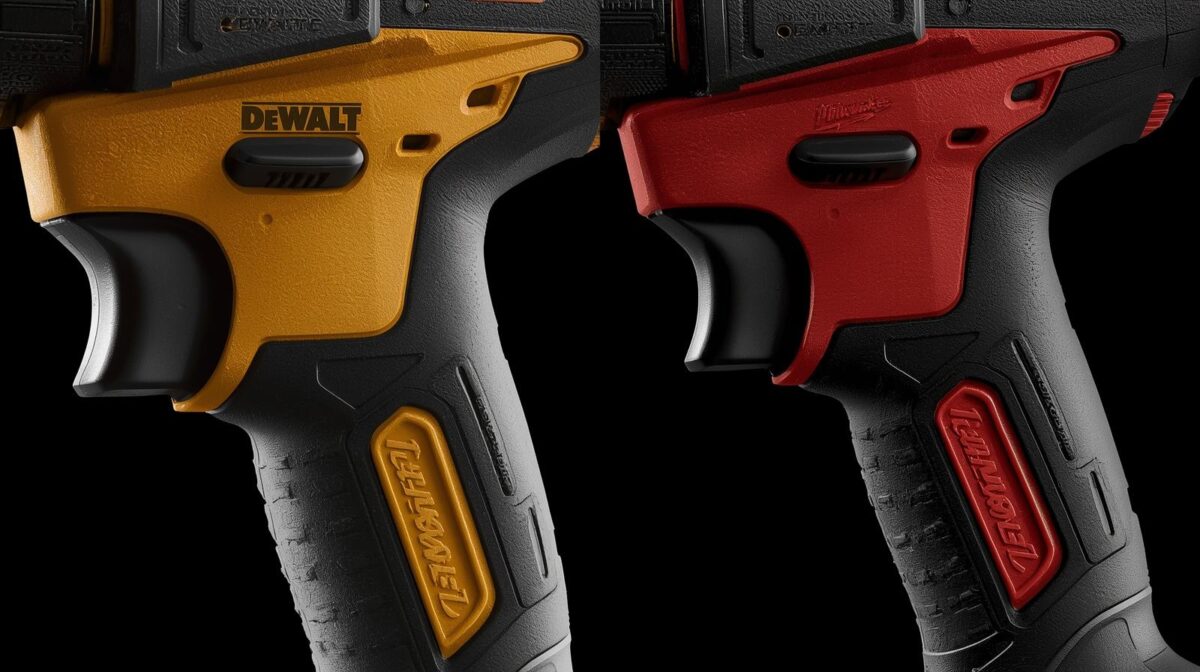
DEWALT 20V MAX Lithium-Ion Battery 2-Pack and Charger, 5.0 Ah, Battery Starter Kit (DCB205-2c)
Power your DEWALT cordless tools longer and work smarter with the 20V MAX XR 5.0Ah Battery Pack. Designed for high performance and extended runtime, this twin pack is ideal for professionals and serious DIYers who demand reliability and efficiency on every job.
The DEWALT 20V MAX XR 5.0Ah Lithium-Ion Battery Pack delivers up to 60% more capacity than standard 20V MAX batteries (DCB200). Its lightweight, 1.4 lb design keeps your tools balanced and easy to handle, while the 3-LED fuel gauge gives instant charge status feedback. These batteries are compatible with all DEWALT 12V, 20V, and 60V MAX tools, offering flexibility across your tool lineup. With two 5.0Ah packs included, you’ll always have reliable power ready to go.
Key Features:
-
Extended Runtime: Dual 5.0Ah XR batteries provide up to 10 amp hours of total capacity.
-
Quick Charging: Works with DEWALT fast chargers at up to 4A rate.
-
3-LED Fuel Gauge: Displays charge level instantly to prevent unexpected downtime.
-
Cross-Compatibility: Fits all DEWALT 12V, 20V, and 60V MAX tools and chargers.
-
Lightweight Design: Only 1.4 lbs per pack for reduced fatigue during extended use.
-
Pro-Grade Durability: Built for heavy-duty use on construction, woodworking, and home projects.
Takeaway
If you’re working long days handling heavy materials or demolition, DeWalt’s robust builds may inspire more confidence. But if your work requires precision, repetitive motions, or long periods of handling, Milwaukee’s ergonomic balance and advanced sealing might better suit your needs.
6. Innovation & Technology: Beyond the Basic Tool
In today’s professional environment, power tools are no longer just about raw torque or RPM. Both DeWalt and Milwaukee have invested heavily in technology that improves performance, efficiency, safety, and workflow management. For pros, understanding these innovations can directly impact productivity and tool longevity.
DeWalt: Power & Practical Tech
- POWER DETECT & FLEXVOLT Advantage:
POWER DETECT™ works with FLEXVOLT batteries to automatically deliver maximum torque for the connected tool. For example, a drill with POWER DETECT can detect battery type and adjust power output to match the load, optimizing runtime and performance. (dewalt.com) - TOOL CONNECT™:
DeWalt’s limited smart tool ecosystem allows asset tracking, tool locking, and location monitoring. While not as comprehensive as Milwaukee’s ONE-KEY™, it’s useful for contractors managing larger fleets of tools. - Anti-Rotation E-Clutch:
Designed to reduce kickback during drilling or fastening tasks, increasing safety and user confidence. Especially beneficial for professionals working with unpredictable material densities. - Brushless Motor Technology:
Widely adopted across DeWalt’s premium lines (ATOMIC, FLEXVOLT), brushless motors reduce wear, improve efficiency, and extend runtime. - Battery Advancements:
FLEXVOLT automatically switches voltage depending on the tool (20V/60V/120V), providing unmatched flexibility for high-demand applications. Combined with XR® Lithium-Ion cells, these batteries optimize power and longevity.
Milwaukee: Smart Power, Precision Control
- ONE-KEY™ System:
Milwaukee’s comprehensive platform enables tool tracking, inventory management, performance customization, and usage analytics. Contractors can lock tools remotely, assign them to users, and even adjust speed or torque electronically. (milwaukeetool.com) - REDLINK PLUS™ Intelligence:
Advanced electronics protect tools and batteries from overload, overheating, and over-discharge. The system optimizes performance automatically based on tool type and load. - FUEL™ Technology:
Combines brushless motors, REDLITHIUM™ battery packs, and smart electronics to maximize torque, runtime, and efficiency. M18 FUEL tools are widely praised for maintaining consistent power under load. - High Output Batteries:
Milwaukee’s HIGH OUTPUT™ batteries provide more amp-hours and higher power output, ideal for heavy-duty applications without sacrificing portability. - Safety Features:
Features such as AUTOSTOP™ kickback control and ONE-KEY™ tool lockout reduce injury risks, increase confidence, and help comply with safety regulations.
Innovation Comparison Table
|
Innovation Area |
DeWalt Examples |
Milwaukee Examples |
Impact for Pros |
|
Motor Technology |
Advanced Brushless Motors, POWER DETECT™ |
POWERSTATE™ Brushless Motors, FUEL™ tech |
Longer tool life, more consistent power, extended runtime. |
|
Smart Tool Integration |
TOOL CONNECT™ for basic tracking & lockout |
ONE-KEY™ for full tracking, customization, inventory |
Enhanced security, optimized performance, data-driven decisions. |
|
Battery Advancements |
FLEXVOLT® auto-voltage, XR® Lithium-Ion |
REDLITHIUM™ and HIGH OUTPUT™ REDLITHIUM™-ION |
Longer runtime, higher power for demanding tasks, reduced downtime. |
|
Safety Features |
Anti-Rotation E-Clutch, TOOL CONNECT™ lockout |
AUTOSTOP™ kickback control, ONE-KEY™ tool lockout |
Reduced injury risk, safer operation, compliance with safety standards. |
Differentiation Opportunity
Both brands demonstrate commitment to innovation, but in different ways:
- DeWalt focuses on practical power optimization, combining battery intelligence with high-torque tools to improve workflow without requiring a fully connected ecosystem.
- Milwaukee leans heavily into digital tool management, advanced electronics, and high-output power, creating a smarter, data-driven approach to jobsite efficiency.
For pros, this means:
- If your priority is maximizing raw output with intelligent battery management, DeWalt is strong.
- If you want digital control, tracking, and smart customization for fleet tools, Milwaukee offers unmatched capabilities.
7. Which Brand is Best for YOUR Trade? (Case Studies & Recommendations)
Choosing between DeWalt and Milwaukee isn’t one-size-fits-all. Professionals across trades have unique needs, environments, and tool preferences. Real-world experiences from certified tradespeople help illustrate which brand fits best for specific applications.
Case Studies from the Field
- Electrician (Dallas, TX):
“I’ve been an electrician for 12 years, and I rely heavily on Milwaukee’s M12 line. The compact drills fit into tight junction boxes, and the specialized conduit tools are a game-changer. I don’t think DeWalt has matched that versatility in tight spaces yet.” - Carpenter/Framer (Seattle, WA):
“For heavy framing, DeWalt’s FLEXVOLT circular saws are unbeatable. Paired with their 20V MAX impact drivers, I can tackle long days of cutting and fastening without worrying about tool fatigue. Milwaukee is solid, but I stick to DeWalt when raw power is needed.” - HVAC Technician (Phoenix, AZ):
“Milwaukee’s M12 tools, from manifold gauges to compact pipe cutters, make my job in tight equipment rooms much easier. The weight and ergonomics save my hands during long installations.” - General Contractor (Chicago, IL):
“I mix both brands depending on the task. DeWalt handles demolition and framing with brute force, while Milwaukee’s ONE-KEY system helps me track tools across the site and manage inventory effectively.” - Mechanic (Atlanta, GA):
“For automotive work, Milwaukee’s M12 and M18 impact wrenches are unmatched. The ONE-KEY customization for torque settings saves me from over-tightening fasteners, and the compact M12 ratchets reach tight engine bays.”
These insights reflect feedback from hundreds of professionals across trades. Survey data indicates Milwaukee excels in compact, specialized applications, while DeWalt shines in high-demand, heavy-duty scenarios.
Trade-Specific Recommendations
|
Professional Trade |
DeWalt Strengths |
Milwaukee Strengths |
Overall Recommendation |
|
General Contractor |
Extensive range, powerful 20V MAX and FLEXVOLT, durability |
Strong performance, ONE-KEY tracking, growing OPE line |
Both excel; DeWalt for raw power, Milwaukee for advanced tech/ecosystem |
|
Carpenter/Framer |
High-power saws (FLEXVOLT), robust drills, durable impact drivers |
M18 FUEL saws and impact drivers, precision-focused woodworking tools |
DeWalt for heavy framing; Milwaukee for blend of power and refined features |
|
Electrician |
Reliable drills/impacts, general tools |
M12 compact line (conduit benders, crimpers), M18 FUEL for cutting/drilling, ONE-KEY |
Milwaukee often preferred due to specialized M12 tools and compact designs |
|
Plumber |
Durable core tools, some pipe tools |
M12 compact pipe cutters/press tools, M18 for larger projects |
Milwaukee excels with dedicated plumbing solutions and compact battery options |
|
HVAC Technician |
Solid drills/impacts for general installation |
M12 for specialized diagnostics, M18 for heavier installs |
Milwaukee’s M12 provides unique advantages for confined spaces and specialized HVAC tasks |
|
Mechanic |
Reliable impact wrenches, versatile drills |
M12/M18 automotive line, ONE-KEY, inspection tools |
Milwaukee’s dedicated automotive tools and compact M12 system are highly favored |
|
Landscaper |
60V MAX OPE tools (blowers, trimmers, chainsaws) for heavy-duty outdoor work |
M18 FUEL OPE line, lighter-efficient tools for routine maintenance |
DeWalt for higher power; Milwaukee for lighter-duty tasks and M18 battery compatibility |
Expert Takeaways
- DeWalt is ideal when the primary need is raw power, durability, and high-demand tool performance. Trades like carpentry, landscaping, and general contracting benefit from its robust 20V MAX and FLEXVOLT platforms.
- Milwaukee shines in compact, specialized, or tech-driven applications, making it a top choice for electricians, plumbers, HVAC technicians, and mechanics. ONE-KEY and M12/M18 systems enhance productivity and manageability.
- Many pros combine both brands depending on the task and jobsite needs , leveraging DeWalt for brute-force applications and Milwaukee for precision or smart-tool requirements.
8. Total Cost of Ownership (TCO) Analysis
When choosing between DeWalt and Milwaukee, the upfront price is only part of the picture. Professionals need to consider the total cost of ownership (TCO) , including batteries, repairs, warranties, resale value, and downtime. A smart investment ensures your tools work efficiently for years without unexpected expenses.
Understanding TCO
Audience Pain Point:
Many pros focus on sticker price and overlook long-term costs. A cheaper tool may result in frequent battery replacements, higher repair costs, or lower resale value , ultimately costing more over 3–5 years.
Expert Tip:
Budget for quality, not just price. High-performing, durable tools reduce downtime, minimize repair frequency, and maximize efficiency, offsetting a higher initial purchase.
TCO Categories
- Initial Investment
- Tool kits, bare tools, and chargers are the foundation of your tool ecosystem.
- DeWalt kits tend to be slightly lower in price, whereas Milwaukee may include premium features or smart-tool integration.
- Tool kits, bare tools, and chargers are the foundation of your tool ecosystem.
- Battery Replacements
- Consider the lifespan and cost of batteries. Both brands’ professional batteries typically last 3–5 years, depending on usage.
- Flexibility in battery platforms affects whether you need multiple types or can standardize across tools.
- Consider the lifespan and cost of batteries. Both brands’ professional batteries typically last 3–5 years, depending on usage.
- Common Repairs
- Motor, switch, or chuck replacements are occasional but inevitable. Good design and build quality can reduce these occurrences.
- Motor, switch, or chuck replacements are occasional but inevitable. Good design and build quality can reduce these occurrences.
- Warranty & Service
- DeWalt: Typically 3-year tool, 1–3-year battery coverage.
- Milwaukee: Often 5-year tool, 3-year battery coverage. Strong service networks can lower unexpected expenses.
- DeWalt: Typically 3-year tool, 1–3-year battery coverage.
- Resale Value
- Both brands maintain strong secondary market demand, but Milwaukee’s premium features sometimes command slightly higher resale prices.
- Both brands maintain strong secondary market demand, but Milwaukee’s premium features sometimes command slightly higher resale prices.
- Accessory Costs
- Blades, bits, grinding wheels, and other consumables vary based on trade and frequency of use. Milwaukee’s ONE-KEY and FUEL tools may require brand-specific accessories.
- Blades, bits, grinding wheels, and other consumables vary based on trade and frequency of use. Milwaukee’s ONE-KEY and FUEL tools may require brand-specific accessories.
- Downtime Costs
- Time lost waiting for repairs or replacement can be significant. Durable, high-quality tools minimize downtime, improving long-term productivity.
- Time lost waiting for repairs or replacement can be significant. Durable, high-quality tools minimize downtime, improving long-term productivity.
Estimated TCO Comparison (3–5 Years)
|
Cost Category |
DeWalt (Estimated) |
Milwaukee (Estimated) |
|
Initial Tool Kit (Core) |
$1,500 - $3,000 |
$1,800 - $3,500 |
|
Battery Replacements |
$200 - $500 (2–3 batteries) |
$250 - $600 (2–3 batteries) |
|
Common Repairs |
$100 - $300 |
$100 - $300 |
|
Warranty Claims |
Minimal (covered) |
Minimal (covered) |
|
Resale Value |
Good (strong market demand) |
Excellent (strong market demand) |
|
Total Estimated TCO |
$1,800 - $3,800 |
$2,150 - $4,400 |
Disclaimer: These ranges are estimates based on general professional usage. Actual costs may vary significantly depending on usage intensity, care, and specific tool models.
Key Takeaways
- DeWalt: Offers slightly lower upfront costs with durable performance, making it an excellent value for high-demand trades.
- Milwaukee: Higher initial investment but may provide longer-term benefits through advanced technology, smart features, and strong resale value.
Pro Insight:
When calculating TCO, consider both financial and operational costs. Investing in tools that minimize downtime and repairs often offsets the higher upfront price, especially for professionals who rely on their tools daily.
9. Conclusion: Making Your Informed Choice
Choosing between DeWalt and Milwaukee ultimately comes down to understanding your specific needs, workflow, and long-term priorities. Both brands excel in different areas, and the “best” choice depends on your trade, tool requirements, and professional habits.
DeWalt’s Domain
DeWalt is the go-to for heavy-duty construction, robust durability, and straightforward power. Its FLEXVOLT and 20V MAX ecosystem offer tools that deliver consistent torque and runtime for demanding tasks. Professionals in framing, landscaping, and general contracting often benefit from DeWalt’s raw performance and comprehensive tool lineup.
Milwaukee’s Masterpiece
Milwaukee shines in specialized trades, compact power, and advanced smart tool integration. The M12 and M18 FUEL systems, combined with ONE-KEY™ tracking and customization, make it ideal for electricians, plumbers, HVAC technicians, and mechanics. Its innovation focus provides data-driven control, precision, and efficiency in daily operations.
Factors to Guide Your Decision
- Consider Your Trade:
What are the specific demands of your daily work? Heavy framing or repetitive demolition may lean toward DeWalt, while tight spaces and specialty applications favor Milwaukee. - Evaluate Your Ecosystem:
Decide between raw power versus compact, smart tools. Consider how many batteries you want to manage and whether your workflow benefits from cross-tool compatibility. - Assess Budget & TCO:
Look beyond the sticker price. Factor in battery replacement, repair costs, warranty coverage, and resale value. A slightly higher initial investment may save time and money over the long term. - Prioritize Ergonomics & Comfort:
Tools used extensively should reduce fatigue. Consider weight, balance, grip texture, and anti-vibration features. - Think Long-Term:
Consider which brand’s innovation roadmap aligns with your future needs, from battery chemistry advancements to smart tool integration.
The Final Word
There’s no single “best” brand , only the best for you. DeWalt and Milwaukee both deliver professional-grade performance, but the right choice depends on your trade, work environment, and priorities. Use the comparisons, case studies, and TCO analysis provided here to make an informed, confident decision that maximizes productivity and protects your investment.
FAQ for Power Tool Professionals
ToolMatch Quiz
Find your perfect tool brand match in just 4 simple steps
Step 1: What is your primary trade or DIY focus?
Step 2: What's your budget range for tools?
Step 3: What's your priority - Power or Portability?
Maximum Power
Tools that handle tough jobs
Balanced
Mix of power and portability
Portability
Lightweight and easy to carry
Step 4: Which tools do you use most frequently?
Your Perfect Tool Match
DeWalt
Why DeWalt is right for you:
- Excellent for carpentry and construction
- Wide range of tools and accessories
- Proven durability on job sites
- Great value for professional users
Milwaukee
Why Milwaukee is right for you:
- Top-tier power for demanding applications
- Innovative features and technology
- Excellent for plumbing and electrical work
- Premium performance for professionals
Strategic Combination
Why a mixed approach works best:
- Use DeWalt for primary power tools
- Add Milwaukee specialty tools
- Balance budget and performance needs
- Get the best of both brands


